Atari Teenage Riot: the interview
Alec Empire talks about band reunions and why major labels ‘should die’
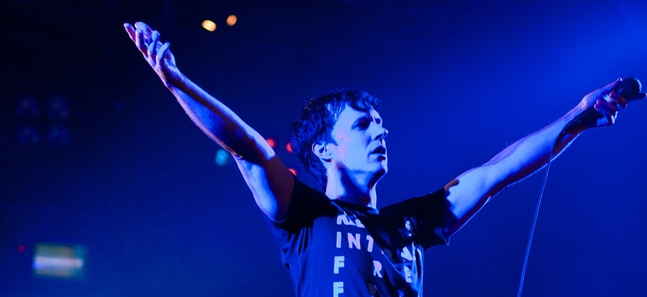
Alec Empire at Fuji Rock Festival 2011. Photo by James Hadfield
Posted: Mon Nov 14 2011
Things didn’t end well for Atari Teenage Riot. It was 1999, and after years of increasingly fractious touring, the German ‘digital hardcore’ group were due to open for Nine Inch Nails in a high-profile show at London’s Brixton Academy. What could’ve been a major coup for them turned ugly when vocalist Hanin Elias walked out on the afternoon of the gig – then uglier still when the remaining members elected to ditch their songs altogether and play a single, 27-minute blast of noise instead. Later released as Live at Brixton Academy, the concert (one of their last, unsurprisingly) became a fittingly abrasive epitaph for a band whose career had seldom run at anything less than full-throttle.
Yet a decade later, Atari Teenage Riot are back, and it’s almost like they never left. They’ve earned stellar reviews for some of their gigs in Europe, and supplied one of the highlights of this year’s Fuji Rock Festival, where their mixture of distorted beats, fuck-the-system polemics and white noise drove the crowd into a frenzy.
‘It’s the riot sounds, man,’ says Alec Empire, ATR mainstay and sonic sorcerer par excellence, from his studio in Berlin. ‘There’s something about distortion when it’s applied in a certain way… that creates these overtones, and it does something with the brain. It triggers certain senses that we can’t explain with normal music science, the way we know it maybe from Western European music.’
Empire (born Alexander Wilke-Steinhof) is a dab hand at tweaking audio to mind-altering ends, pushing the mixing desk until it becomes more like a machine gun. In a Twitter exchange earlier this year, he told me he’d made a ceiling collapse when DJing at a club in 1994 (‘[the] hole was about the size of [the] dancefloor. Serious stuff. Old socialist architecture’), and he speaks with contempt about sound engineers who’ve attempted to rein in the violence of his music. ‘“Nobody has ever complained, Alec,” ’ he says with a laugh. ‘That’s like my favourite line from people in the music industry.’
Empire is the sole original member in ATR, mk. II. MC Carl Crack died from a drug overdose in 2001, and while it was Elias who instigated the reunion, she quickly ducked out (apparently because her voice was shot, though she’s subsequently denied this). Nic Endo – who’d officially joined the band on 1999 album 60 Second Wipe Out and continued to tour with Empire during the 2000s – has now become one of the lead vocalists, and is accompanied by larger-than-life Brooklyn rapper CX Kidtronik. Amazingly, it still works: they may no longer teeter on the verge of a nervous breakdown the way they did in the late-’90s, but ATR in 2011 are every bit as full-on.
‘Atari is only about that energy,’ says Empire. ‘Very often when reunions happen, most of the musicians involved haven’t played for a long time. I think that’s where the problem sometimes comes up: you start where you left off, you miss all those years, and of course you’ve changed... Say you’re a boxer or something, and you were still boxing and training, and then somebody asks you, “Hey, do you want to get back in the ring properly?” You’re still kind of fit for the ring – while maybe if you haven’t done anything for ten years, then it could be like a big shock, because you get knocked out very fast (Laughs).’
After returning to the live arena last year, the group have now reached the make-or-break point in any band reunion: they’ve released a new album. Is This Hyperreal? earned a thumbs-up from old supporters the NME when it came out in June, but was dismissed as an anachronism by influential music website Pitchfork, in what Empire calls ‘probably one of the dumbest reviews I’ve ever read about any record.’ While 60 Second Wipe Out, their final ’90s album, was a singularly punishing listen, this one tones down the noise and breakcore and gives the vocals more precedence, often pairing them with a clomping four-four beat that’s almost danceable.
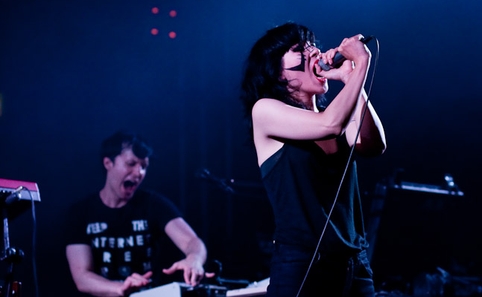
‘For this record it felt more like: let’s have the message more at the forefront, and let’s get back to that basic ATR sound,’ says Empire. ‘That was a creative decision. I still feel that was the right thing for that album, but of course if somebody says, “Look, I love ATR more when it’s like super crazy and it’s completely unlistenable–” (Laughs) I can also understand that.’
Unlike many other reunions, he insists that this one wasn’t about the money (‘Maybe if you’re forced into this because you actually have to pay your rent or something – I don’t want to judge these people – but we weren't in that position’). However, ATR still have unfinished business to take care of... not least with the major record labels.
‘They should die,’ Empire says, unleashing another peal of laughter. ‘I said – in a certain naive way – in about ’93 or something, “Yeah, we’re going to survive all the majors and we’re going to kill them…” If Atari Teenage Riot are still around when some of these major labels aren’t, that is a major victory. (Laughs) A major victory for humanity!’
Yet his hatred of the ‘corrupt’ majors hasn’t led Empire to an unconditional embrace of the web-based alternatives, either: ‘I hate to say it, but some of that democratic process that people promised ten years ago – the internet would provide free distribution for everybody – hasn’t brought these amazing new talents, and it hasn’t changed the music industry as much as some people hoped.’
This scepticism ties in with a wider mistrust of the web that has seen the group branded as ‘anti-internet’ in some quarters (hello again, Pitchfork), but it isn’t quite that simple. If anything, their present concerns are perfectly in line with the principles of a bunch of anarchic anti-fascists who debuted with a song called ‘Hetzjagd Auf Nazis’ (‘Hunt the Nazis’). You can buy ATR T-shirts carrying the slogan ‘Keep the Internet Free From Government Control’, and Is This Hyperreal? contains frequent references to how the web has been co-opted and controlled – most memorably on ‘Digital Decay’, where Endo votes 'let's abolish the existing grid.’
Back in the physical world, ATR’s anti-corporate shoutalong ‘Black Flags’ – with its refrain of ‘Are you ready to testify?’ – has become a de facto anthem for the Occupy protest movement. The song soundtracked a video released by hacktivist collective Anonymous in early October to call for further actions, while a subsequent promo vid was laced with clips of masked protestors.
More surprisingly, the track has found some mainstream crossover appeal, thanks to an Ed Banger-style remix by Swedish producer Tony Senghore. ‘When I saw that Fatboy Slim chose this as number one in his October charts, I was like: “This is amazing, he plays this in a stadium," ’ says Empire. ‘There’s like 20,000 people going crazy, and there are the lyrics: "There’s a class war going on / It’s the rich who are waging it…” All this stuff is being…’ He bursts out laughing. ‘This is actually subversive: the definition of.’
Atari Teenage Riot play at Liquidroom, Ebisu on Nov 17
Tweets
- About Us |
- Work for Time Out |
- Send us info |
- Advertising |
- Mobile edition |
- Terms & Conditions |
- Privacy policy |
- Contact Us
Copyright © 2014 Time Out Tokyo










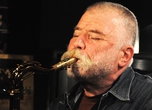
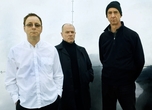

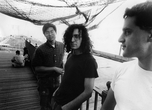
Add your comment